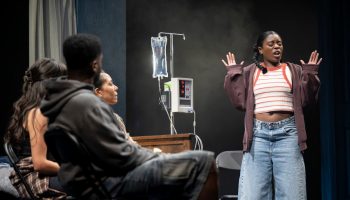
Gabriel Weber
Staff writer
In a Time for Three jukebox show, violinists Nicolas “Nick” Kendall and Charles Yang with double bassist Ranaan Meyer take the stage at 4 p.m. today in Elizabeth S. Lenna Hall for a high-contrast performance, while employing their love for improvisation.
This is the second performance by the Grammy and Emmy-winning ensemble within three days at Chautauqua, and they plan on picking their program based on the vibe of the place itself, Kendall said. Time for Three intends to project their group spirit to the audience for a communicative and shared experience.
“We obviously send our energy out into a space, but we also love bringing the energy up on stage with the interplay between the three of us,” Kendall said. “We like to jam on things that are super familiar, but really showcase our creativity and what challenges us while being incredibly fulfilling for us. So there’s a lot of arc and contrast.”
Time for Three aims to step outside of the conventional through their programming; they provide a variety of emotionality through music while also bringing a mix of classical and traditionally popular music.
Pushing creative boundaries “engages us in a way that never allows us to get rusty — it keeps us fresh and keeps our edge,” Kendall said. “That’s something that I think we’re very lucky (to have) in our career, that we are always having to be on our toes.”
Kendall said they’ll likely be playing “Chaconne in Winter,” which is an arrangement by the ensemble themselves of Johann Sebastian Bach’s piece. Overall, the chamber recital will be a solid mix of originals and covers.
Young people’s engagement with music is a priority for Time for Three, as the opportunities they were presented with as kids — like witnessing Yo-Yo Ma perform — changed their lives. The ensemble performs in front of pre-professional musicians as much as possible to show that this is an accessible profession through dedication.
“When you engage with music when you’re young, you’re working a side of your brain that you just cannot get to in other disciplines — which are equally as important. But, we feel like the creativity and the activity of learning how to play within an ensemble cultivates teamwork, along with the need for discipline, or getting in tune is really perfecting your techniques so that you can say more,” Kendall said. “We have this phrase ‘freedom comes from discipline,’ which we feel like applies to life. It’s an application within the context of a greater curriculum that will no doubt help them, even if they do not become a professional musician, exist in the professional world in a unique way in order to be adaptable, work creatively in a team setting and learn how to communicate in a nuanced way.”
As many burgeoning musicians hardly want to spend hours pouring over a piece when there’s friends to hang out with and sports to play, Kendall feels grateful to the adults in his life for their encouragement.
“Since we actually did the work for many, many hours when we were young, we are able to do what we do now,” he said. “You can draw a straight line from that, and that’s why it’s cool to be able to do this — and we love doing it.”
Time for Three just recently performed for a wide range of ages in China with the Shanghai Symphony Orchestra.
“It was unbelievable how much the people there reacted to us. They have technique up the wazoo, but what’s hard for them to unlock is how to use all that technique to serve their desire to be expressive as people. We were able to show how you can stand on the shoulders of technique and tradition to feel the freedom to express yourself without being wild,” Kendall said. “That was a huge thing that we were able to do for the young people in China and, of course, all around the world. We try to do that as much as possible.”
Returning to Chautauqua feels like a privilege for Kendall, in considering the accomplishments of individuals — in the broader scope of poets, world leaders and writers — who have come before Time for Three.
“It’s just crazy that we get to be part of that sharing; we don’t take it for granted, and we just feel very appreciative,” Kendall said.
While the group was founded in 1999, Zachary DePue departed for his role of concertmaster at the Indianapolis Symphony Orchestra and Julliard graduate Charles Yang joined in 2015, and Time for Three has had plenty of time to establish a solid base of communication through instruments and emotional bonds. Going through all the natural highs and lows of life while creating art together results in a unique kind of group chemistry.
“The double-edged sword is that we are away from our families a lot, so we see each other more than we do our family. We are brothers, which means that we really get into it. It’s a real relationship, which is knowing how to argue and knowing how to solve disagreements. We have all of the beautiful contrasts in fights, but then mega celebrations that you ride together and that bond comes through,” Kendall said. “One of the qualities that I just cannot get over, and why I love this band so much, is no matter how tired we are, or even if we get pissed off with each other, when we play together, there’s this generosity of spirit.”




